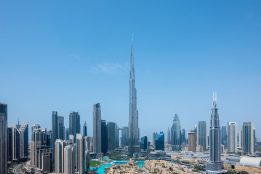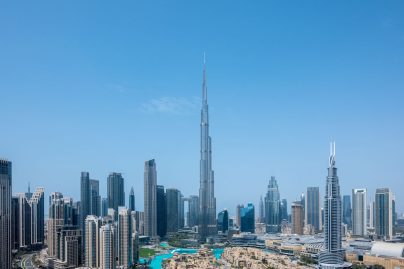Fashinza aims to be the biggest sustainable and futuristic supply chain for fashion brands in the UAE
Tue 18 Jan 2022
- Global B2B manufacturing marketplace, Fashinza, looks towards the future after stellar growth through the pandemic
The lockdowns caused by the pandemic were devastating for the garment manufacturing industry. However, during this same period, Fashinza, a global B2B manufacturing marketplace, has grown by over 2000% despite Covid-19 disrupting the global apparel supply chain.
Fashinza was started to help small and medium-sized, ethical factories connect with global demand and throughout the pandemic, they have seen meteoric success. The company has only one mission and it is to create sustainable and futuristic supply chains for fashion brands across the world.
TheBrew.ae had the opportunity to interview one of the founders of the company, Jamil Ahmad who are confident that Fashinza will become one of the biggest global supply chain and tech-driven companies in the next five years. “Our mission at Fashinza is to create sustainable and futuristic supply chains for fashion brands and in the process, foster a more positive work environment for workers.”
Speaking about the key initiatives they have in place for the company to realize their goals, Jamil Ahmad said, “Our future initiatives will primarily focus on our core goals, which include sustainable production, empowerment of women workers, and upliftment of MSMEs. We’ll invest our resources in improving supply chain technology to ensure that brands have access to end-to-end transparency while sourcing their products. On the supply side, we’ll leverage technology to help MSMEs scale and compete in the global market. Last but not the least, we want to create a versatile platform that is a quick one-stop-shop for all B2B fashion needs, one that elevates the end-to-end sourcing experience.”
The B2B fashion industry is going through a transformation with the rise of digitization. Many brands are innovating and carving out their niches in the market. What is Fashinza doing to add value to the B2B fashion retail industry?
Jamil said that “We are using AI-led technology on our platform that automates everything from finding the right supplier to managing production across all the stakeholders. Our platforms also enable our clients to keep up with current fashion trends. This is very important now given that trend cycles are becoming shorter and it’s no longer prudent to plan 6 months in advance for something that’s going to become old in a month. We specialize in helping our clients assess these trends and source products in real-time.”
The lockdowns caused by the pandemic have been one of the biggest drivers of change in the global supply chain over the past few years. How is Fashinza helping manufacturers and distributors get through the global supply chain crisis in the wake of the pandemic?
“Throughout 2020 and major parts of 2021, when many factories were shutting down, Fashinza helped MSMEs to fight back by bringing global orders to their doorstep. We not only ensured a regular flow of orders for our manufacturing partners, but for many, we created opportunities to scale. Fashinza has also been extending financial support in the form of working capital, credit, and immediate payment to manufacturers,” Jamil said.
In this competitive landscape, what made their brand unique when compared to other players in the industry. Jamil added that “We have not one but two USPs – our platform and our service. Firstly, our platform with its advanced AI technology offers 100% transparency to clients in terms of production tracking. Brands no longer need to haphazardly switch between emails, apps, and excel sheets to track their orders. They can now receive daily updates on the latest production status on our platform, and if need be, they can communicate with our team 24/7 through the same platform. Our second USP is our ultrafast manufacturing capacity. Brands can have an entire range produced and dispatched within 13 days while working with Fashinza. The average industry lead time stands at 3 to 4 months at present. It’s an added benefit that our team takes care of end-to-end production management. So, all a sourcing manager has to do is place their order, and Fashinza takes care of everything else from designing to delivery.”
Fashinza prides itself on its transparency, efficiency, and ethical sourcing. Commenting on how they ensure efficiency and sustainability in their fashion sourcing Jamil Ahmad said, “Our manufacturing partners include industry leaders who prioritize sustainability and ethical manufacturing as their core business value. We perform stringent audits to ensure they bear Fairtrade, GOTs, or other relevant certifications and follow the fair wage and safe working standards recommended by local governments. As for efficiency, our platform helps manufacturers to streamline their operations by hosting all order documentation and production updates in one place.”
With investors and consumers becoming more concerned with sustainability, resale and re-commerce are gaining greater importance. In what ways is Fashinza contributing towards the demand for a circular economy for the retail fashion industry?
Jamil Ahmad talked about sustainability and said that “Sustainability is a top priority for Fashinza, and we’ve been taking multiple initiatives to reduce our environmental impact and build a sustainable supply chain. We highly encourage brands to use sustainable fabrics, dyes, and methods by offering them at competitive prices. By leveraging our scale to reduce costs, we’ve been trying to introduce 50% BCI cotton within the supply chain.”
To underscore the importance of transparency in their operation they also added, “Our insistence on building a transparent supply chain pushes manufacturers to adopt sustainable and ethical measures since they’re faced with social transparency and accountability.”
On the biggest challenges Fashinza currently facing in the industry and the plans, they have made to address them moving forward. Jamil informed that “The biggest challenge that not only Fashinza, but the world is facing right now is climate change. We aim to build an environmentally net positive supply chain at a scale that doesn’t incur extra costs and we aim to do this by 2030.”
They acknowledge that many variables make it difficult to anticipate the changes that climate change will bring, “it is our mission, and we believe that with a strategic approach and timely actions, the goal can be achieved.”

 Apr 20 2024
Apr 20 2024













